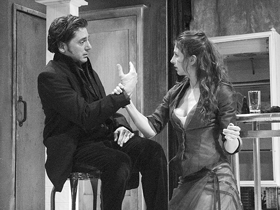Craig Lucas revives Stringberg’s look at illicit love; Charlotte Meehan tackles corporate absurdism
Despite its hallowed place in the theatrical canon, I have never been excited by August Strindberg’s “Miss Julie.” The play, at once a dark study of class structures, animal instincts, manners and gender roles has, in the many productions I’ve seen, always been hobbled by its arcane premises, overwrought acting and leaden direction—seldom more tiresome than in last year’s Off-Broadway mounting.
“Miss Julie,” it seems, is caught in a time and place removed from contemporary audiences. I thought the play had not aged well but was nonetheless mounted with regularity because it’s relatively short and supposed to be theater that’s “good for you.”
I love it when I’m dead wrong. Turns out, “Miss Julie” is still a vibrant and a compelling play, and all it needed was the brilliant playwright Craig Lucas to breathe new life into it, with a stunning new adaptation that is consistently exciting and at times downright harrowing. One can only hope that this will become the standard adaptation of the play for the next century or so.
Lucas hasn’t changed a bit of the plot. It still is the story of an upper-class woman whose basest passions and misguided sense of her own power lead her to a tryst with a family servant, only to realize that she is the one ultimately debased. What Lucas has changed is the focus of the play. He has wisely de-emphasized class analysis and instead focused on interpersonal power struggles. The play now seems more accessible; its notions of gender, power and greed come to the fore, nowhere more than in the play’s treatment of illicit sex.
For Jean, the footman, and his fiancée, the cook Kristine, sex is devoid of any romantic illusion. For Jean, it is an expression of power, something that can be used to manipulate and control, or so he thinks. For Miss Julie, however, sex is an expression of a romantic attachment, however one-sided that romantic attachment might be. When these various perspectives collide, only destruction can follow, and neither Strindberg nor Lucas offers any panaceas. There is no good—or even livable—answer.
This lack of resolution, of course, is why “Miss Julie” has been consistently cited as one of the seminal works of modern theater. Yet it takes Lucas to make this script as truly disquieting as it should be and relevant to a contemporary audience. It’s still not perfect. There are elements of melodrama that continue to mar the script, and the final moments seem incongruous. Lucas has not abandoned the roots of Strindberg. He has simply peeled back what has been allowed to calcify around this play—and restored its power to shock.
The production at the Rattlestick Playwrights Theater under the direction of Anders Cato has a driving energy that propels the play. There is an underlying sense of the suppressed passions, rages and powerlessness that drive these characters. Reg Rogers as Jean is exciting and aggressive yet with a subtle sense of his subservient role—one that ultimately drives him to emotional and physical violence. Jean is often played as an ambitious brute, but Rogers digs deeper to find the frustration that can only be expressed in sexual terms by the footman.
Marin Hinkle as Miss Julie delivers a similarly multi-layered portrayal. She is persistent in her desire to have it all, control it all and face no consequences for her actions. Hinkle allows us to watch as Julie essentially drowns in a world that she must admit is beyond her control.
Julia Gibson gives a fine performance as Kristine—perhaps the only character willing to confront reality. Her jaundiced eye and her acceptance of the world as it is, without any romantic trappings at all, is the counterweight to Jean and Miss Julie. I have seldom seen this part contribute so powerfully to the play’s overall impact.
The wonderful basement set is by John McDermott with excellent costumes by Oliveira Gajic and lighting by Ed McCarthy. They have transformed the Rattlestick’s small space into a perfect metaphor for the torturous confinement of the soul representing the cost of the human condition that is the essence of this play.
Charlotte Meehan’s, “Work,” at The Flea, is a twisted little play. Under the sure-handed direction of Jim Simpson, this antic quasi-farce examines the soul-numbing falseness of life in the corporate world. Running a scant 65 minutes, the play manages to skewer every stereotype of that environment at the same time examining how we are all too willing to abandon ourselves to serve something shapeless, distant and removed from our humanity.
Staged in the Flea’s basement theater, a long, narrow, black box, the cast members run to and fro between scenes like gerbils. There is a lot of pointless activity, emotional devastation and meaningless interaction, just like in the real world, with the characters’ their destinies, Meehan wants to say, controlled by an unseen “God,” the voice of the boss.
The whole enterprise comes across as facile, but mostly this is an entertaining satire that will doubtless fan the flames of those who hate their day jobs.
gaycitynews.com


































